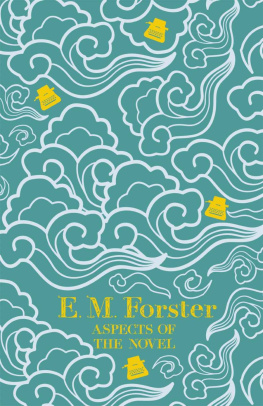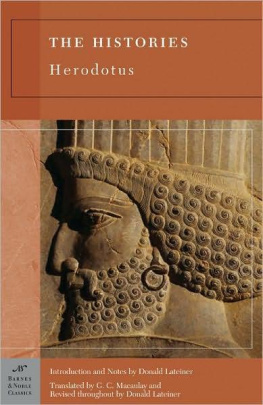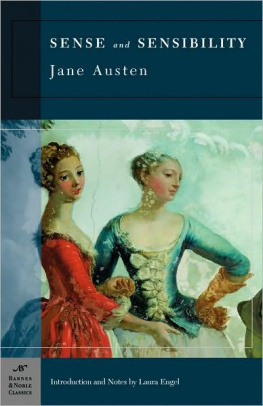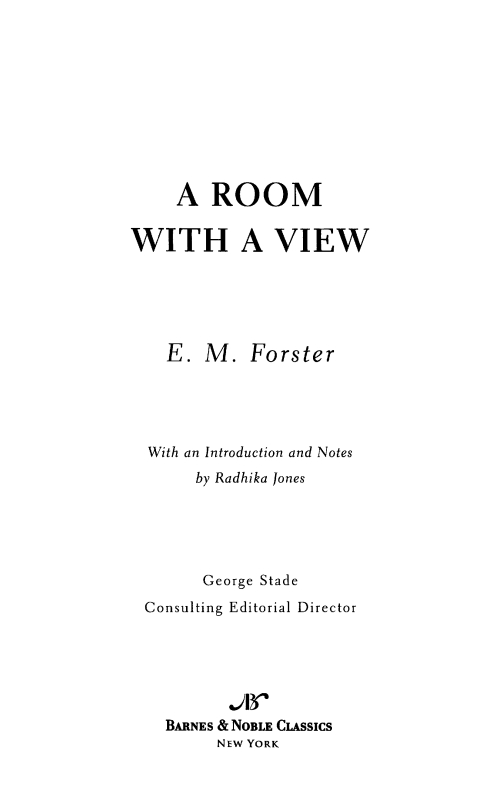
Table of Contents
From the pages of
A Room with a View
Women like looking at a view; men dont.
(page 9)
I am, as it were, she concluded, the chaperon of my young cousin, Lucy, and it would be a serious thing if I put her under an obligation to people of whom we know nothing.
(page 12)
This she might not attempt. It was unladylike. Why? Why were most big things unladylike?
(page 41)
The well-known world had broken up, and there emerged Florence, a magic city where people thought and did the most extraordinary things. Murder, accusations of murder, a lady clinging to one man and being rude to anotherwere these the daily incidents of her streets?
(page 55)
He longed to hint to her that not here lay her vocation; that a womans power and charm reside in mystery, not in muscular rant. But possibly rant is a sign of vitality: it mars the beautiful creature, but shows that she is alive.
(page 97)
He will work off his crudities in time. I rather mistrust young men who slip into life gracefully.
(page 137)
Honest orthodoxy Cecil respected, but he always assumed that honesty is the result of a spiritual crisis; he could not imagine it was a natural birthright, that might grow heavenward like the flowers. All that he said on this subject pained her, though he exuded tolerance from every pore; somehow the Emersons were different.
(page 144)
We cast a shadow on something wherever we stand, and it is no good moving from place to place to save things; because the shadow always follows. Choose a place where you wont do harmyes, choose a place where you wont do very much harm, and stand in it for all you are worth, facing the sunshine.
(page 145)
All modern books are bad, said Cecil, who was annoyed at her inattention, and vented his annoyance on literature. Every one writes for money in these days.
(page 151)
Isnt romance capricious! I never notice it in you young people; you do nothing but play lawn tennis, and say that romance is dead, while the Miss Alans are struggling with all the weapons of propriety against the terrible thing. A really comfortable pension at Constantinople! So they call it out of decency, but in their hearts they want a pension with magic windows opening on the foam of perilous seas in fairyland forlorn!
(page 169)
I want more independence, said Lucy lamely; she knew that she wanted something, and independence is a useful cry; we can always say that we have not got it.
(page 184)
Take an old mans word; theres nothing worse than a muddle in all the world. It is easy to face Death and Fate, and the things that sound so dreadful. It is on my muddles that I look back with horroron the things that I might have avoided.
(page 191)
We fight for more than Love or Pleasure; there is Truth. Truth counts. Truth does count.
(page 194)
Ah! it was worth while; it was the great joy that they had expected, and countless little joys of which they had never dreamt.
(page 197)
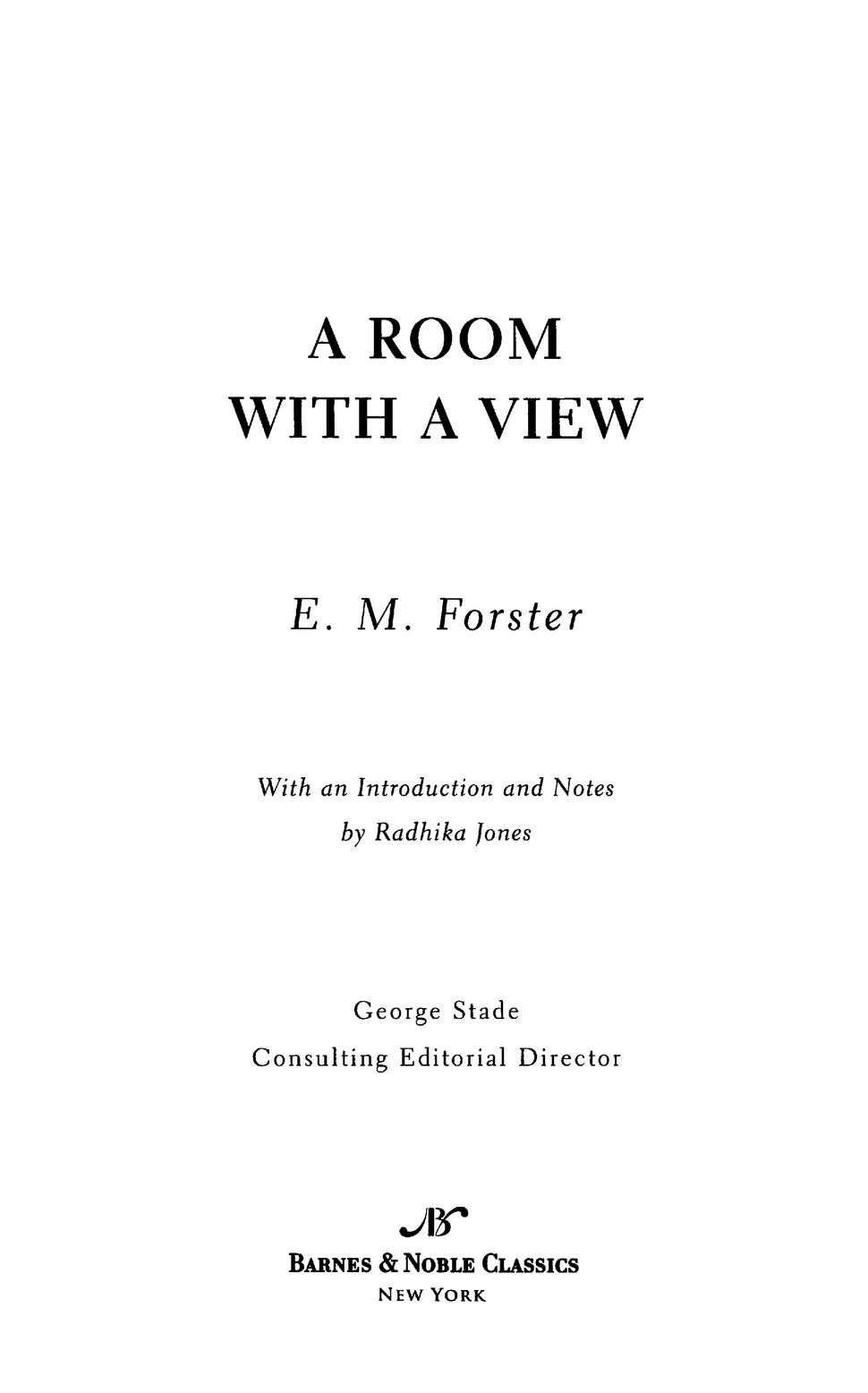
E. M. Forster
Edward Morgan Forster was born in London on New Years Day, 1879. Before he reached his second year, he lost his father, an architect, to tuberculosis. After his fathers death Edward was raised by his mother and aunts, who doted on him and dressed him as Little Lord Fauntleroy for photographs and drawings. While the inner sanctums of female life may have been somewhat oppressive to the young boy, the settings were also inspirational. Forsters early stories of wardrobes and earrings were set in the domestic world that would inspire some of his greatest novels.
Although he was beloved at home, Edwards sensitivity and slight physique made him the target of school bullies until he entered Kings College, Cambridge, in 1897. College was a revelation to the young intellectual, who flourished under the cultivation of his dons and his peers and was inducted into the Apostles, one of the universitys most exclusive societies. There, amid conversations with some of Englands greatest contemporary thinkers, Forster became known for his subtle wit and quietly brilliant observations. Not so subtle, however, was the force of his creative spirit, which began to flower during this period. Awakened to his homosexuality, the young writer penned a series of adventurous erotic stories and began experimenting with the novelistic form.
The years after his graduation were marked by uncertainty: How to live and what to do were Forsters pressing concerns, and he pursued his writing with great intensity. Four novelsWhere Angels Fear to Tread, The Longest Journey, A Room with a View, and Howards Endappeared between 1905 and 1910, sealing Forsters fame as an emerging writer of tremendous talent. Teaching Latin, lecturing, and holding court with the Bloomsbury group during this period left time for little else. Nevertheless, Forster fell madly in love with an Indian student named Syed Ross Masood. The love was unrequited, but the experience compelled Forster to travel to India, the first of two voyages that more than a decade later would inspire his last novel, considered by many to be his greatest.
As World War I loomed over Europe, Forster again left England, this time to work for the Red Cross in Alexandria, Egypt. Despite a passionate affair with a young Egyptian man, the years-long exposure to human suffering left Forster rather jaded and drained. Another journey to India proved inspirational, however, and in 1924 the authors masterpiece, A Passage to India, was published; though it was his last novel, it was hardly his final piece of writing. In his remaining years Forster authored more than four hundred works that included essays, articles, introductions, lectures, reviews, and biographies. He also deepened his commitment to literary freedom and fought censorship in all its forms.
E. M. Forster died in Coventry, England, at age ninety-one on June 7, 1970.
The World of E. M. Forster and
A Room with a View
| 1879 | Edward Morgan Forster is born on January 1 in London to Edward Morgan Llewellyn Forster and Alice Clara (Lily) Whichelo. |
| 1880 | Edward senior, an architect, dies of tuberculosis. After his fathers death, Edward is raised by women, who dote on him. |
| 1883 | Edward and his mother settle in the countryside of Hertfordshire , at Rooksnest, which later will be the inspiration for the house in Howards End. |
| 1887 | Marianne Monie Thornton, Edwards beloved paternal great-aunt, dies, leaving him an inheritance of 8,000. Arthur Conan Doyles A Study in Scarlet, the first Sherlock Holmes story, is published. |
| 1890 | Oscar Wilde publishes The Picture of Dorian Gray. |
| 1891 | Thomas Hardys Tess of the dUrbervilles appears. |
| 1893 | The family moves to Tonbridge, Kent, where Edward enters prep school. He is mercilessly teased by the athletic set for his delicate, sensitive disposition. |
| 1897 | Forster enters Kings College, Cambridge. His studies in classics and history earn him honors, and he makes important intellectual connections with his dons and fellow students . Widely recognized as a brilliant thinker, he is inducted into the Apostles, Cambridges most famous intellectual society. The Apostles introduce him to his future Bloomsbury companions Lytton Strachey and John Maynard Keynes. Bram Stokers |


